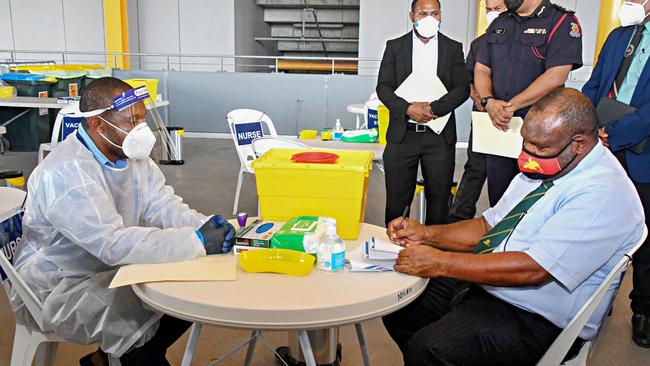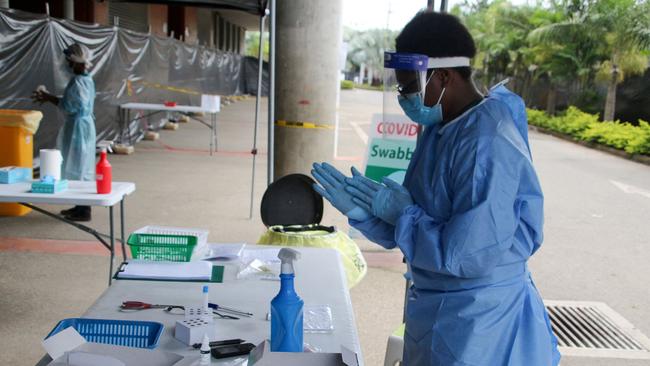China winning Pacific vaccine diplomacy war
Australia is in a race against time to secure millions of COVID-19 jabs for the Pacific or risk a Chinese vaccine diplomacy victory

Australia is in a race against time to secure millions of COVID jabs for the Pacific in the next four weeks or risk a Chinese vaccine diplomacy victory that would push regional partners closer to Beijing.
Papua New Guinea has accepted 200,000 Chinese Sinopharm jabs in recent days, and Solomon Islands Prime Minister Manasseh Sogavare says Chinese vaccines are the next step in his country’s COVID response.
Fiji says it will also accept Chinese jabs when they are approved by the World Health Organisation, which is expected to occur by the end of the month.
Australia has donated 8500 AstraZeneca jabs to PNG to vaccinate frontline health workers amid a worsening COVID crisis, but has been unable to secure a promised one million shots for the country from Europe.
Burnet Institute director Brendan Crabb said PNG, which he believes now has more than one million COVID cases, needed to source vaccines wherever it could.
He said once the Chinese vaccines received WHO approval, “I see no reason why they shouldn’t be used in PNG as well”.
“It’s an ‘all hands on deck’ situation,” Professor Crabb said.
Supplying the shots is only half the battle. Transporting them across the country and “getting them into people’s arms” was also an urgent priority, he said.
PNG accepted the one-shot Chinese vaccines ahead of WHO approval on the basis that they would be used to vaccinate Chinese citizens in the country.

However, there are far fewer than 200,000 Chinese in PNG, leaving thousands of Sinopharm shots potentially available for Papua New Guineans.
Lowy Institute Pacific program director Jonathan Pryne said Australia was in “a race to get the Pacific access to Western vaccines … It will be a significant blow to Australia, just as we are stepping up our effort in the Pacific, for China to take the lead in a vaccine rollout, and in turn economic recovery, in the Pacific
“Should the WHO approve the (Chinese) vaccines, Pacific nations would be absolutely within their rights to take whatever is offered and readily available. Australia would have no moral authority to stop them,” Mr Pryke said.
“Ideally, we would want Pacific nations to have Western vaccines but if the only option is a Chinese WHO-endorsed vaccine, then we should be helping with the rollout.”
The US could reportedly assist in getting Australia’s one million paid-for AstraZeneca doses to PNG from Europe, where EU authorities have so far blocked them from being exported.
Amid heightened tensions between Western allies and China, Defence Minister Peter Dutton said Australia would continue to work closely with the US to maintain regional stability. “We don’t do it in an antagonistic way, we do it in a way to protect our sovereignty and our national interests,” he said. “We don’t support militarisation of ports, we don’t support any foreign country trying to exert influence here by cyber or other means, we don’t want to see conflict in our region.”
PNG Health Minister Jelta Wong told a Lowy Institute podcast that his country was grateful for the assistance it was receiving from all of its international partners. “We’re getting help from everywhere, and it’s good help,” Mr Wong said, adding that the vaccine rollout would be “a real challenge”, given high levels of misinformation circulating on Facebook. “When Facebook hit PNG, everybody became an expert. (It was like) everyone had a PhD. They could be sitting under a coconut tree and get a PhD,” Mr Wong said.
The Department of Foreign Affairs and Trade said Australia was providing “a comprehensive package of support to help PNG respond to its COVID crisis”.
“Australia has committed $144.7m to ensure PNG has access to full coverage of safe and effective vaccines, and the systems in place for a broad national rollout,” a DFAT spokeswoman said.
“We are working with PNG, the WHO and UNICEF to help prepare for the fast and safe large-scale rollout of vaccines. This includes working on supporting planning, logistics, training and public information.”
Australia has also pledged $80m to the UN-backed Covax initiative to help vaccinate 20 per cent of the population of Southeast Asia and the Pacific. The scheme will provide 588,000 vaccines for PNG by June.
Labor Pacific spokesman Pat Conroy said Australia needed to urgently deliver on its commitment to the region or risk ceding influence to China. “It is vital Australia remains the partner of choice for Pacific island nations,” he said. “If Australia does not step up and provide adequate and timely assistance, this will create a vacuum that will be filled by nations such as China.”
The Chinese Foreign Ministry announced in February it had provided or planned to provide vaccine assistance to 53 countries and export to 27 countries.
US Secretary of State Antony Blinken recently denounced China’s vaccine diplomacy, saying it came with “strings attached … We shouldn’t tie the distribution or access to vaccines to politics or to geopolitics.”
The WHO hopes to issue recommendations on China’s Sinovac and Sinopharm vaccines by the end of April.




To join the conversation, please log in. Don't have an account? Register
Join the conversation, you are commenting as Logout